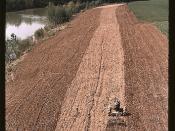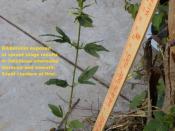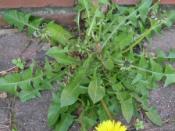IntroductionGibberellic acid (GA) is a simple gibberellin, a hormone which is found in plants. Gibberellic acid elongates cells and increase plant's growth. Gibberellic acids are "family of diterpene acids that are synthesized by the terpenoid pathway in plastids and then modified in the endoplasmic reticulum and cytosol until they reach their biologically-active form" (Wikipedia, 2006). This experiment tested the hypothesis that applying GA will stimulate the elongation of stems in two types of plants: wild-type and rosette mutant. The prediction was that the plants treated with GA would have a longer stem, than the plants that are treated with water.
MethodsThe hypothesis was tested using two different types of Brassica Rapa plant. One type is a normal wild-type plant, other is a rosette mutant. The experiment was begun by filling up a four chambered container with a soil and adding a few beads of fertilizer. Two wild-type seeds were planted in each of two cells of container, and labeled as "Wild Type, Water" and "Wild Type, GA."
Other two cells were been planted with two rosette seeds each, and labeled as 'Rosette, Water" and "Rosette, GA." After the plants start growing, GA and water was applied to each leaf on a plant according to the treatment labels. Water and GA has been applied four times in a two day interval. The height of plants was measured before applying GA and water. The results were been recorded in the data table. The plant's height was measured in centimeters. There were seven lab groups that participated in this experiment. Each group had its own four chambered container with plants and data. When experiment was over, the data from seven lab groups has been collected and used to calculate the average height for wild-type plant and the...


